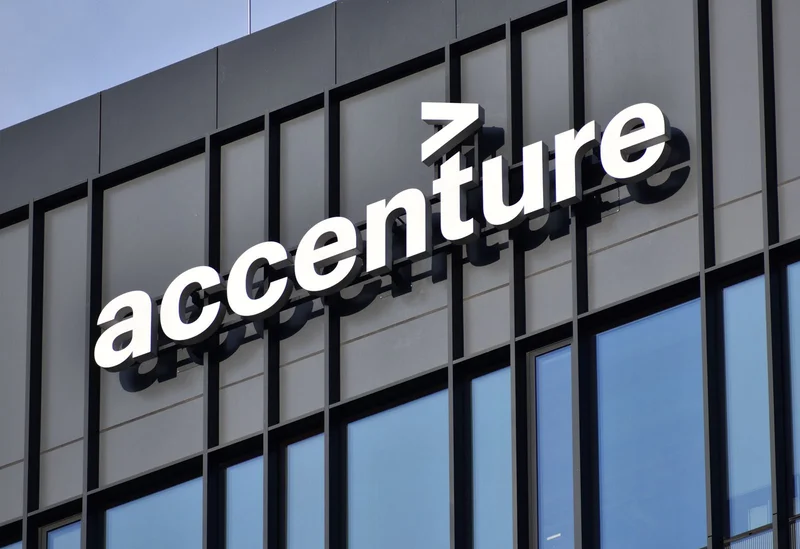Accenture is telling two stories.
The first story, the one it wants you to read, is about the future. It’s a polished narrative of innovation, investment, and a seamless transition into an automated age. This week, that story came in the form of a press release announcing an investment in Lyzr, an "agent infrastructure platform." The language is predictably optimistic. Accenture Ventures is helping a promising AI startup scale. Lyzr’s platform will help clients in banking and insurance build a "secure, autonomous AI workforce" and "modernize slow manual processes."
It’s a clean, forward-looking narrative. Accenture, the wise titan of consulting, is guiding its clients toward a brighter, more efficient tomorrow. Kenneth Saldanha, a global lead at the firm, praised Lyzr’s "responsible AI features" that help navigate "the complexities of heavily regulated industries." It all sounds perfectly logical, even admirable.
But there’s a second story. This one isn’t told in a press release; it’s found in the cold, hard numbers of headcount reductions and severance costs. It’s a story about the present, and it’s far less clean.
While one hand was writing a check to Lyzr (for an undisclosed amount, naturally), the other was signing pink slips. Over a recent three-month period, from May to August, Accenture’s total headcount fell by more than 11,000 people. To be more exact, it dropped from roughly 791,000 to 779,000. This wasn't a quiet trim; it was a strategic culling, part of a massive AI-focused restructuring program that is expected to cost the company around $865 million in severance payments alone.
Let’s pause and look at these two data points side-by-side. On one side, we have a strategic investment in a company that builds AI "agents" to automate workflows. On the other, we have Accenture Lays Off Thousands of Employees to Make Room for AI, explicitly linked to an AI-driven overhaul. This isn't a coincidence; it's a correlation. One action is the enabler for the other. The glowing press release about Lyzr is the marketing brochure for the very technology that underpins the layoffs.

Accenture’s strategy is a bit like a city council announcing a beautiful new public park while simultaneously bulldozing a neighborhood to make room for it. They'll hand you a glossy pamphlet with artist renderings of the park, complete with smiling families and green spaces, but they’d prefer you didn’t look at the rubble or talk to the displaced residents. The investment in Lyzr is the pamphlet; the 11,000 laid-off employees are the rubble.
I've looked at hundreds of these corporate restructuring filings, and this particular pattern is becoming depressingly common. A company publicly champions its commitment to "responsible AI" while its actions suggest a definition of "responsibility" that extends primarily to the bottom line, not the workforce. What does it mean to deploy "explainable and compliant AI agents" when the most immediate, explainable outcome is mass job loss? Is the primary function of these "safeguards" to protect the company from liability rather than to protect its employees from obsolescence?
The numbers here are stark. If we take the projected severance cost of $865 million and divide it by the 11,000+ employees let go, we get an average cost of around $78,000 per person (a figure that covers severance and other related expenses). This is the tangible, upfront cost of swapping out human capital for what Accenture hopes will be more efficient, and cheaper, automated capital.
This is the part of the analysis that I find genuinely puzzling from a long-term strategic perspective. Accenture’s entire business is built on human expertise—its consultants, analysts, and project managers. They are the product. Now, the company is signaling to its remaining 779,000 employees, and to its clients, that this core product is being systematically devalued and replaced. The plan is to "train its remaining staff on different AI platforms," but what does that training look like? Is it a fundamental reskilling for a new era, or is it a crash course in how to operate the machine that will eventually make your own job redundant?
The company claims this is about enhancing operational efficiency. But what is the true, all-in cost of this "efficiency"? It’s not just the $865 million in severance. It’s the loss of institutional knowledge. It’s the hit to morale for the employees who remain, wondering if they’re next. It’s the potential damage to client relationships when experienced human account managers are replaced by AI agents that, despite all the safeguards, lack genuine intuition and context.
You can’t simply swap out a human for an AI agent like you’re changing a tire. A human workforce is an ecosystem of knowledge, relationships, and experience built over years. An AI workforce is a tool. A powerful tool, certainly, but one that operates on logic, not wisdom. Accenture is betting that the logic is enough. It’s a massive, high-stakes wager, and the initial ante is 11,000 jobs.
At its core, Accenture's strategy isn't complex. It's a simple, almost clinical, act of substitution. They are spending hundreds of millions to remove expensive, variable human assets from the balance sheet and investing an unknown, but likely smaller, amount to replace them with scalable, predictable AI assets. The PR about "responsible AI" and "enhancing capabilities" is just the anesthetic administered before the surgery. The numbers don't lie: this is a calculated exchange. One human out, one AI agent in. The only question that remains is whether the patient—the long-term health of the company itself—survives the procedure.